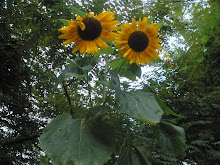5 months down, 3 months to go.
The drought has been in full swing until recently. The past few days have been rather rainy. Believe it or not, I had my first really rainy day where I had to work wet since early spring. Most of the rainstorms have been few and far between, lasting minutes and giving way to hot sunshine drying us off almost immediately. The relief from the humidity as it rains is not held over once the cloud passes however.
The rain is need to refill the irrigation pond, or we may be out of a job sooner.
Cooler temperatures are needed to enable the planting (and success) of the fall lettuces-- or we may be out of a job sooner.
The tomatoes need to avoid the blight and continue producing plenty of fruit...or we may be out a a job sooner. Some of them have begun to die off, while others are still going strong.
Its been most interesting to me to see the different methods of harvesting-- some plants we must wait for much of it to die, dry up and shrivel before we know it is ready to be harvested. The garlic, bulb onions, potatoes and dry bean plants are harvested in this manner.
To harvest potatoes we pull a large shovel behind the tractor that digs a trench, pulling up what's left of the potato plants and releasing the potatoes among the piles of dirt. Then we must sift thoroughly through the fallout to collect them all. If I were to grow potatoes just for myself and family members I would create a 3ft tall loop of chicken wire and secure it into the ground, fill it with topsoil and compost and plant the potatos there-- that way when they are ready for harvest, I could cut the chicken wire loop releasing the dirt into a loose pile where I could easily sift through and collect my potatoes. I wouldn't suggest doing it for market if one did not have a tractor- that's some really back breaking labor.
Really half my job these days is cutting rotten tomatoes and either laying them at the base of the plant for added nutrients or collecting them for composting. Some plants have almost 98% rotten or otherwise unsellable tomatoes.
The saddest part of my job is how much we sacrifice to the compost pile that could have been given away to food shelters--split tomatoes, soft squash, onions with only the outer layer gone "bad". None of which are bad in any real sense of the word- only that no one will buy them at the market.
The health liability issues are much too complex and expensive. I want to get involved in fixing this problem in the future. This is the second job I have had involving serious waste problems that have not been properly addressed. I know it is a terrible nationwide tragedy.
This winter I plan on moving back in with mom and pops, saving up money for grad shcool and volunteering at food shelters in Hartford. Maybe then I will be able to get some new insights into the issues involved with that sector of social services.
Wish us luck on the rainfall and temperature.I miss you all and can't wait to hear from you about how things are on your side of the fence. Take care!!
Sunday, August 15, 2010
Subscribe to:
Posts (Atom)
